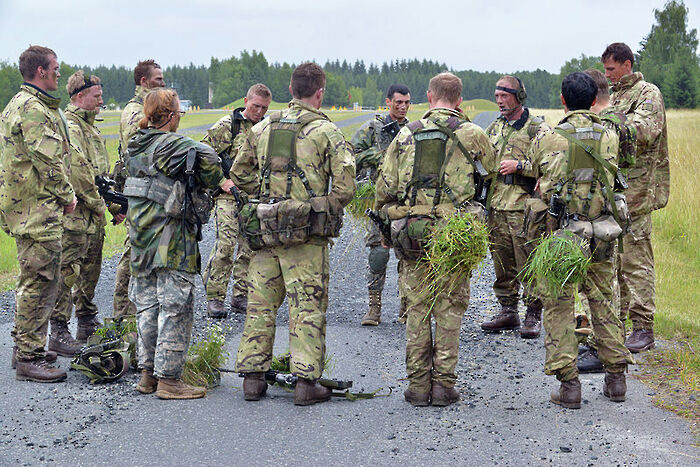The realities of conscription need to be reconsidered
In response to a recent article on the advantages of conscription, Anna Hollingsworth urges us to reconsider the implications of the gendered conscription practices in Finland

Reading Naman Habtom-Desta’s case for conscription, I felt like all the world’s problems could be solved: people will be less keen on their country getting militarily involved elsewhere as the army is not made up of paid professionals, a universal draft promises social equality, and even greater egalitarianism is on the cards as conscripts’ social horizons are broadened mixing with their fellow conscripts from far and wide in their country. Increased chances of world peace and social equality, what’s not to like?
If, however, you take a moment to look at an actual example of conscription instead of painting a bizarrely idealistic picture of concept, you will soon realise that the reality does not look quite as nice.
As Habtom-Desta points out, conscription comes in many shapes and sizes and with different purposes. I’m going with Finland – first, because that’s where I’ve grown up and where I’ve watched half of my age group get drafted, and second, because if a country that keeps topping the rankings for most gender equality, least corruption, best education, and just generally the best place in the world to live in cannot do a decent version of conscription, then who could?
In Finland, conscription means that every 18-year-old man gets drafted to do military service, a minimum of six months learning to shoot, salute and ski. The system is meant to guarantee a credible national defence – a sparsely-populated country with hundreds of miles of border with Russia is not exactly a geopolitical jackpot. But in reality, conscription guarantees nothing but an outdated, sexist, and human rights-violating structure.
From a gender equality perspective, men-only conscription shouts out blatant sexism. Women have been allowed to opt for military service since 1995 – 300 women do so each year (I was not one of them) – but the underlying inequality of drafting only men remains. There is absolutely no reason why only men should be drafted, and politicians consistently fail to give one. In everyday conversations, though, reasons are found in everything from women serving their duty to their country by giving birth, and boys growing into men in the army – it is not uncommon to regard military service as a male rite of passage. It is as if the topic of conscription causes all conversation to undergo a bizarre time warp where all the gender equality established elsewhere in society evaporates.
“But even if gender neutral drafting is implemented, it does not do away with the more fundamental issue of conscription violating personal freedom”
That an update to the 21st century just might be on the cards is reflected in several political youth organisations calling for a gender-neutral model, whether this be a universal draft or a Norway-style model of drafting the most suitable people in a given age group – where, crucially, gender plays no role in determining suitability.
But even if gender neutral drafting is implemented, it does not do away with the more fundamental issue of conscription violating personal freedom. You could argue that any state-enforced activity – paying taxes or attending compulsory education – violates individual freedom. Yet somehow, to me at least, training people to, essentially, kill and ask them to put their life at risk in the case of war is on a somewhat different level than asking them to attack basic spelling and maths with pen and paper. Now, there is an option to go for so-called civilian service – which can be anything from working in schools and universities to helping out at old people’s homes and youth centres. However, the minimum time for civilian service goes up to one year, doubling the minimum requirement for military service. As such, non-military service is considered as punitive and discriminatory in length by Amnesty International.
What if for reasons of conscience you do not want to – or better, cannot – take part in the military service, and object to the punishment masked as civilian service? Total objectors face a prison sentence of six months – repeatedly condemned by the UN Human Rights Committee, and Amnesty International classifying conscientious objectors as prisoners of conscience.
I won’t disagree with Habtom-Desta’s argument that conscription has its upsides: teamwork and leadership skills, enhanced fitness, an ability to make your bed (literally) with military precision, mingling with people from different backgrounds (just not the ones who are women and who object to serving in the military). But what I fail to see is why we would need a blatantly sexist system violating human rights – read: conscription – to achieve any of that
 Comment / Cambridge’s tourism risks commodifying students18 April 2025
Comment / Cambridge’s tourism risks commodifying students18 April 2025 News / Cambridge student numbers fall amid nationwide decline14 April 2025
News / Cambridge student numbers fall amid nationwide decline14 April 2025 News / Greenwich House occupiers miss deadline to respond to University legal action15 April 2025
News / Greenwich House occupiers miss deadline to respond to University legal action15 April 2025 Comment / The Cambridge workload prioritises quantity over quality 16 April 2025
Comment / The Cambridge workload prioritises quantity over quality 16 April 2025 News / Varsity ChatGPT survey17 April 2025
News / Varsity ChatGPT survey17 April 2025





